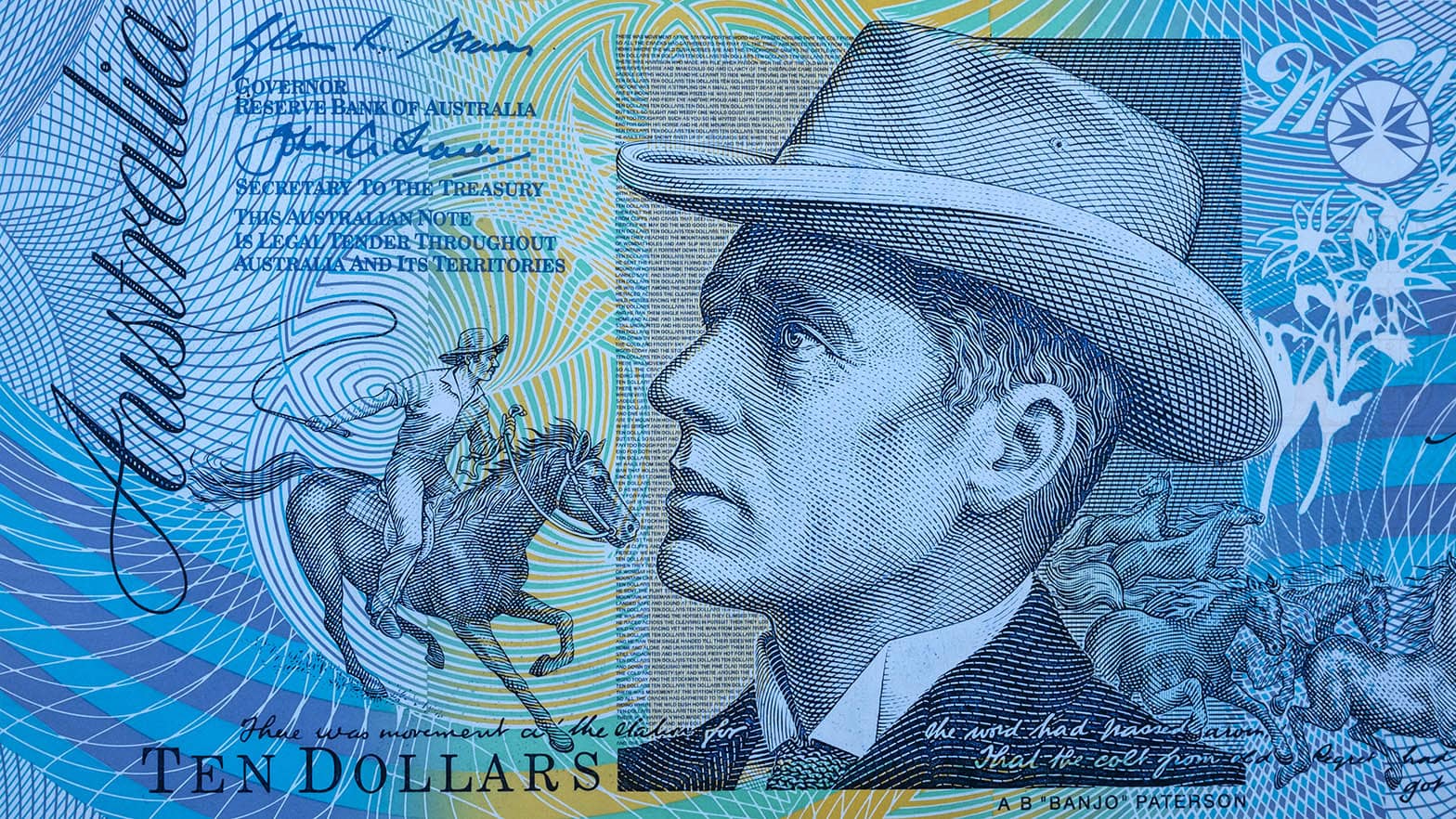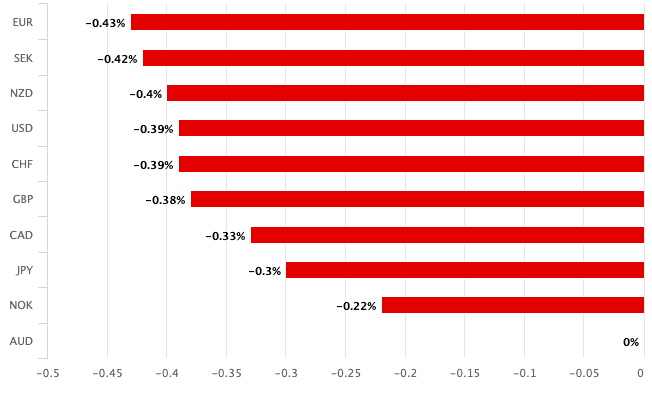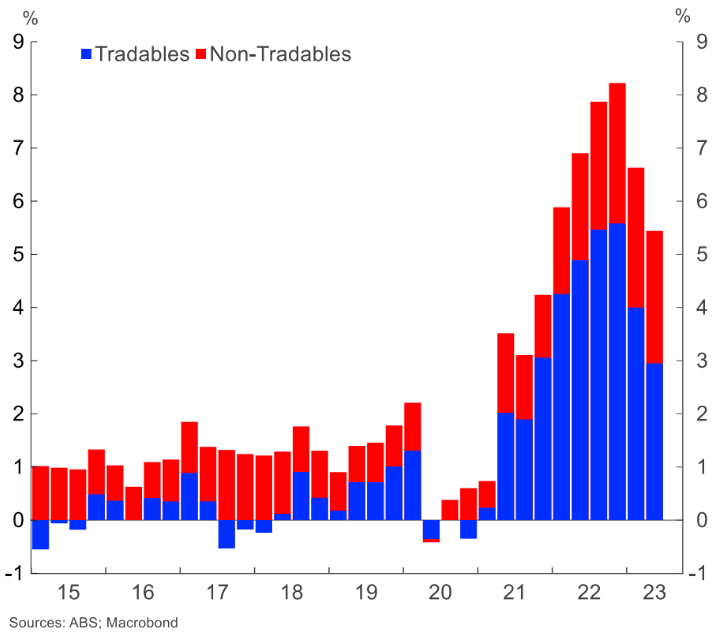Australian Dollar Sold After Soft Aussie Inflation Print
- Written by: Gary Howes
- Aus inflation comes in below expectations
- Markets lower RBA rate hike bets
- AUD falls in tandem with this repricing
- But CBA says one more hike likely
- Which could surprise markets and boost AUD

Image © Adobe Images
The Australian Dollar was weaker after it was reported Australia's headline rate of inflation retreated from 5.6% year-on-year to 5.4% in the second quarter, prompting markets to lower expectations for an August 01 interest rate hike at the Reserve Bank of Australia (RBA).
The quarter-on-quarter figure released by the ABS showed CPI inflation rose 0.8%, which was below the 1.0% the market was expecting and the 1.4% announced in the first quarter.
"The June quarter inflation report showed that inflation is declining at a quicker pace than expected," says Pat Bustamante, Senior Economist at St.George Bank.
The market duly cut its expectations for further interest rate hikes at the RBA, a development reflected in lower Australian bond yields and a weaker currency.
Carol Kong, a strategist at Commonwealth Bank of Australia, says the Australian Dollar dropped 0.7% after the weaker than expected inflation data for the second quarter.
In fact, the Aussie was down against all its G10 peers, proving the inflation release to be a truly market-moving surprise:

Above: The Australian Dollar was weaker across the board in the wake of the inflation release.
Against the U.S. Dollar, the Aussie fell to AUDUSD 0.6728 before paring that loss to 0.6761 at the time of writing. The Pound to Australian Dollar exchange rate (GBPAUD) rose to as high as 1.9134 before easing back to 1.9070.
Although the headline CPI rate has fallen, it is perhaps the subcomponents of the data set that are having the more significant impacts on markets.
"The RBA's preferred measure of inflation, the trimmed mean or 'core' inflation, moderated by almost 0.75 percentage points to be 5.9% higher in annual terms," says Bustamante.
St. George Bank's economists note the prices of market services, that are closely linked to aggregate demand and labour market conditions, also pulled back significantly.
Market services contributed less than 0.4 percentage points to non-tradable inflation, down from 0.8 percentage points recorded last quarter.
"This suggests that the inflationary impulse related to domestic demand could be moderating and moderating quickly," says Bustamante.
Image courtesy of St. George Bank.
Economists say the outcome of the July inflation release is key to the RBA's next decision, which will be important in determining Australian Dollar value and Aussie bond yields.
"Inflation is falling. The headline and underlying reads were both lower than the RBA’s own forecasts. The pullback in the prices of market services would be very pleasing. Today’s result increases the risk that the RBA pauses next week to assess the long and treacherous policy lags," says Bustamante.
Following the data, markets were seen to be pricing in a growing chance that the RBA keeps rates on hold at its next meeting, with the chance of an August hike down from 44% to 16% according to overnight swap markets.
Australian government bonds are also outperforming in reflection of this development, with the 10-year bond's yield down -3.4bps to 3.99%.
"The inflation pulse in the Australian economy continues to track lower. Inflation remains high, but is heading in the right direction as goods inflation continues to retreat, partially offset by strong services inflation," says Belinda Allen, Senior Economist at Commonwealth Bank of Australia (CBA).
CBA attributes part of the fall in inflation to improved global supply chains as well as the RBA's rapid interest rate hiking cycle, and economists expect one more hike from the central bank.
"The CPI today has set up the RBA August Board meeting decision to once again be finely balanced. A slightly softer June quarter inflation, but still resilient labour market, high services inflation, a recovering housing market and concerns around productivity growth will all feature in the policy deliberation," says Allen.
Given the uncertainty around the path of services and consumer inflation the path of least regret, according to Allen, is for the RBA to deliver one final rate hike in August, taking the cash rate to 4.35%.
Markets are therefore in for another surprise if the CBA view proves correct, given investors have scaled back expectations for a further hike in the wake of the data.
This would in turn likely boost the Australian Dollar on August 01 and could limit further Aussie Dollar weakness into the new month.
Compare GBP to AUD Exchange Rates
Find out how much you could save on your pound to Australian dollar transfer
Potential saving vs high street banks:
A$4,875.00
Free • No obligation • Takes 2 minutes





